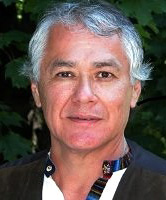
Thohahoken Michael Doxtater
Las Vegas, N.M – A social activist, filmmaker and indigenous knowledge scholar from the Six Nations Reserve in Canada will share his expertise with Highlands University and the community beginning April 18.
Thohahoken Michael Doxtater, a member of the Mohawk Nation and a professor at Six Nations Polytechnic in Ontario, Canada, is at Highlands thanks to the Ballen Visiting Scholar program.
“Dr. Doxtater is a prolific scholar of international stature and is recognized as a leader and innovator in indigenous and media arts studies,” said Rebecca Maldonado Moore, the social work professor who wrote the Ballen Scholar proposal. “He’s a very charismatic individual who I believe will inspire our students to pursue community activism.”
Moore is the coordinator for the Indigenous Knowledge Center the Highlands School of Social Work launched in October 2015.
“Dr. Doxtater will provide an expert perspective on further developing our Indigenous Knowledge Center and bring a fresh viewpoint on diversity issues in higher education to our campus,” Moore said.
On April 19 at 3 p.m., Doxtater will present a talk for the Las Vegas and campus community titled, “Social Justice and Community Activism: Why We Do What We Do.” A reception will follow his talk, which will be in the Student Union Ballroom, 800 National Ave.
Doxtater’s work has centered primarily upon the Six Nations of the Grand River Reserve in Ontario, Canada, which consists of the Mohawk, Oneida, Cayuga, Seneca, Onondaga and Tuscarora tribes.
“My life experience as a practitioner is in grassroots organizing at the community level,” Doxtater said. “In Canada, I’ve worked on indigenous issues like asbestos in schools, land claims and stopping an outside landfill on Six Nations land.”
Doxtater said that over the last 30 years, indigenous knowledge has been a new frontier to recover old knowledge.
“The area I work in is practical indigenous knowledge that gets down to the basics like medicine, digging wells, building lodges and growing food without using fossil fuels and electricity,” Doxtater said.
Moore said that since the 1990s, Doxtater has played a key role in changing Canada’s treatment of indigenous populations, using filmmaking as a platform for social change.
As head of Studio One of the National Film Board of Canada, Doxtater produced films like No Turning Back, a documentary about the Royal Commission’s findings on aboriginal life in Canada, and Where the Spirit Lives, a historical feature film about indigenous boarding schools.
“At Studio One we cultivated capacity in the native community to produce quality video productions that could be broadcast anywhere,” Doxtater said.
Studio One films have aired from the public Canadian Broadcasting Corporation to PBS in the U.S. and beyond.
“Academically, I’m a social scientist studying the interaction of individuals within society. My research focuses on how to restructure, reorganize and reenvision organizations,” Doxtater said.
During his two weeks at Highlands, Doxtater will teach a number of classes and participatory workshops for social work, media arts, and Native American and Hispano studies students. He will teach at the university’s main campus, Santa Fe Center and Farmington Center.
“My teaching focuses on helping students develop as critical thinkers who can participate fully in society and understand the world they live in,” Doxtater said. “In the area of social work or any caring services there is a wide range of indigenous knowledge about how to work with individuals to guide them in creating solutions to their own problems.”
Doxtater said in his teaching he stresses finding solutions to local problems using local wisdom and local knowledge.
During his time at Highlands, Doxtater will also teach a variety of workshops for faculty and staff on topics such as social justice issues and services for Native American communities.
Doxtater and Moore will also facilitate a strategic planning process for the Highlands Indigenous Knowledge Center.
Doxtater taught previously on the faculty of Canadian universities such as McGill University, Wilfred Laurier University and McMaster University.
He earned his Ph.D. in social foundations from Cornell University, where he was instrumental in restructuring the American Indian Program. Moore met Doxtater at Cornell, where she also earned her Ph.D. She is a member of the Northern Arapaho Wind River Reservation in Wyoming.
